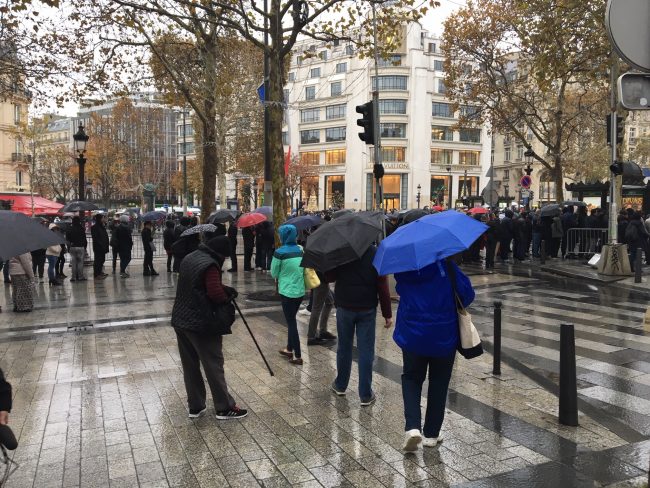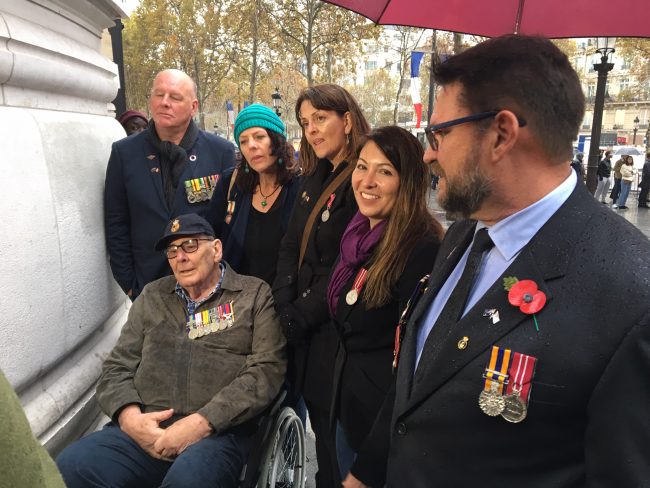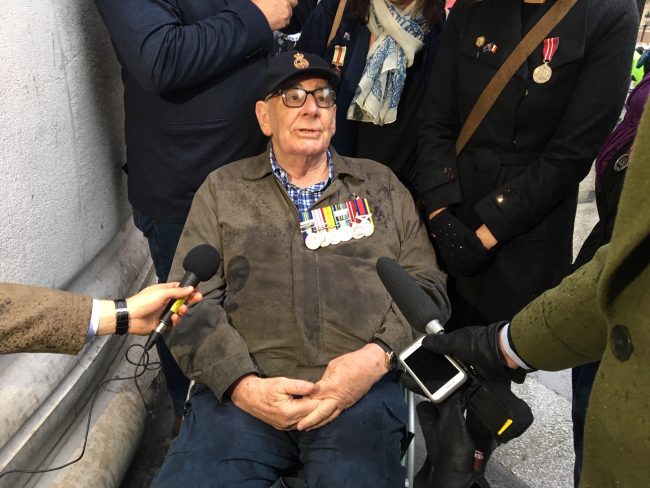Dozens of world leaders sat by the Tomb of the Unknown Soldier at Paris’ Arc de Triomphe on Sunday for a ceremony to mark 100 years since the signing of the armistice that ended the First World War.

On the dreary, grey and rainy morning, thousands of people spent hours in line to watch the event – but security kept them so far back from the leaders they had to watch on giant screens instead.
Neither pouring rain nor lack of access thinned the crowds. Among them, a handful of Canadians – most recognizable by their poppies, worn proudly thousands of kilometres away from home.
READ MORE: Canada’s Remembrance Day ceremonies mark 100-year anniversary of First World War armistice
“I wrote my Master’s degree on the First World War, so I thought that coming here to see the centennial would be the trip of a lifetime,” said Daniel Sonego, who travelled to Paris from Ottawa.
Sonego calls the signing of the armistice a century ago a “founding moment” of the last century.
WATCH: Canadians head to France and Belgium to honour fallen soldiers

“Really sort of a birth in tragedy, but hopefully we’ve learned the lessons of the war,” he said.
WATCH: The untold story of the 1918 Armistice

“You would hope we could learn, and it’s true we may not have learned enough,” said Paul Thomson.
Thomson came to Paris from Guelph, Ont. His great-uncle Albert George Hughes was killed in the First World War at age 20.

Get breaking National news
Hughes was sent to the front in 1916, and spent just a short time in the trenches as a soldier with the Western Ontario Regiment before he was killed.
READ MORE: 330 Canadians, my great uncle and a cemetery 6,000 km from home
Thomson said he’s at the Paris event to remember him as well as try and learn some lessons from the past.
“It’s a good opportunity to look back at what actually happened a hundred years ago, and how many people actually died in some pretty grave circumstances. You look at the battlefields and the trench wars that went on for years,” Thomson said.
“Hopefully people appreciate that, and try to find alternatives to wars.”
Christopher Federico knows first-hand the deadly consequences of war.
Federico served in Sudan with the United Nations in 2006. He’s a Lt.-Col. in the Canadian Army Reserve, and teaches at the Canadian Army Command and Staff College.
Federico says it’s “fantastic” to see Prime Minister Justin Trudeau attend the event.
“We talk about Canada’s role in World War One and that ‘seat at the table,’ and I think it’s just as important we’re here this year.”
READ MORE: Germany’s Merkel, France’s Macron in emotional show of unity a century after WWI
Just as important, he says, is the big picture. Between 60 and 80 world leaders were present at the event.
Trudeau had a prime spot close to the centre of the front row. On either side of him sat the Moroccan crown prince and king, and Israeli Prime Minister Benjamin Netanyahu and his wife.
On the other side of the Moroccans sat U.S. President Donald Trump, first lady Melania Trump, German Chancellor Angela Merkel, French President Emmanuel Macron, Brigitte Macron and Russian President Vladimir Putin.
WATCH: Trudeau pays respects to fallen soldiers in France

“I think the important piece is the number of heads of state and heads of government that are here,” said Federico.
“That we come together and say, ‘We said at the time, this was the war to end all wars.’ Unfortunately it hasn’t been, but maybe we’re a little step closer.”
WATCH: World leaders arrive in France ahead of Remembrance Day

Elsewhere in the crowd, Australian veteran Lindsay McDonald knows the importance of bringing nations together. And he’s quick to point out the longstanding ties between our two Commonwealth nations.
“It’s worth pointing out the Canadians and the Australians often served together in the First World War. A lot of the major battles on the Somme were spearheaded by Canadian and Australian troops,” said McDonald.
“In all the histories you’ll read that the Australians and the Canadians were largely regarded as the shock troops. Like, they wanted a tough job done, send in the Canucks and the Aussies.”
READ MORE: Criticism rains down on Trump after he cancels visit to WWI cemetery due to weather
McDonald has a chest full of medals from his time in the Australian Navy. Now 81, he uses a wheelchair to get around, but he travelled all the way to Paris with his children because he “really wanted to be here.”
“It’s respect. As simple as that. Showing respect to the guys, what they did.”
































Comments
Want to discuss? Please read our Commenting Policy first.